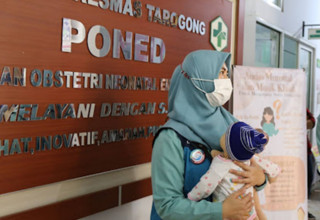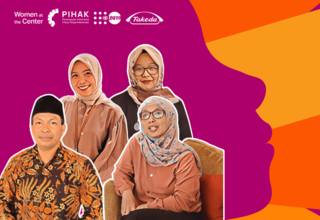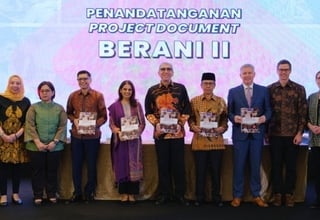
After three decades of service with UNFPA, Indonesia’s Representative Mr. Jose Ferraris will step down from the agency to retire. Having served at the Fund’s Headquarters, in Latin America and the Caribbean, in Eastern Europe and in the Asia and the Pacific regions, Mr. Ferraris will wrap up his five-year stint with the Indonesia Country Office on Friday, 16 October.
While his 30-year career with the Fund has seen the Filipino native work in New York and in duty stations in China, Albania, the Maldives, Mexico, Mongolia, Pakistan and Fiji, Mr. Ferraris credits his last five years in Indonesia as “the best years of his professional life at UNFPA and a fitting close to a long career”.
“It has been an honor to serve all four Executive Directors of UNFPA – Rafael Salas, Nafis Sadik, Thoraya Obaid and Babatunde Osotimehin,” Mr. Ferraris explained, adding that the one constant during his career was the commitment, dedication and excellence of UNFPA staff, who he admits “changed him for the better”.
“I have seen and have been part of the momentous changes within the organization, particularly the years leading up to and after the ICPD in Cairo in 1994. Cairo changed everything for UNFPA.”
We sat down with UNFPA Indonesia’s Representative to discuss significant achievements, lessons learned and his thoughts on the future of the agency in the archipelago.
Can you share some of your significant achievements during your tenure as the UNFPA Representative in Indonesia?
The past five years, from September 2010 till today, coincided with UNFPA’s 8th country programme cycle in Indonesia.
I am honored and privileged to be part of its most significant achievements. These include, among others, the technical contribution to the National Population and Family Planning Board (BKKBN) in the revitalization of the family planning programme, through the development of a comprehensive rights-based strategy addressing the bottlenecks in the delivery of and access to family planning; setting up the FP2020 Country Committee, which is recognized as a best practice worldwide; establishing the South-South Cooperation programmes on the role of religious leaders in family planning, on comprehensive family planning training and with the innovative bilateral programme on family planning with the region of Mindanao in the Philippines.
There was also the pilot implementation of a social-franchising scheme to deliver adolescent sexual and reproductive health services in Yogyakarta; the establishment of a National Reference Group on male involvement, which brings together government, civil-society organizations, development partners and academics together to discuss policy and best practices in promoting the involvement of boys and men in gender-based violence and sexual and reproductive health programmes; a youth development and leadership programme that allowed bright and energetic young people to work with UNFPA to raise the bar on youth issues in sexual and reproductive health, gender equality and population and development; technical support to the programme on the Prevention of Sexual Transmission of HIV within the National AIDS Commission; the work in the humanitarian field to incorporate reproductive health, sexual and gender-based violence and population data in the national response; and policy research and the generation of knowledge products on current and emerging population and development issues in Indonesia – which has promoted dialogue between institutions that generate and analyze data and those that use them for public policy.
There are many others that UNFPA Indonesia can be proud of in terms of its work during these past five years and I am honored to have led the Country Office in many of these endeavours.
Were there any areas where you wished you could have re-examined UNFPA’s strategies of engagement?
Not everything was perfect during these past five years. The relationship between UNFPA and its partners – both government and civil society – have matured and we have learned a lot from each other.
Some of the challenges might have come from not fully understanding the contexts in which UNFPA derives its mandates, or perhaps not having the complete knowledge of the rapidly evolving social, political, cultural and institutional contexts of government policies and programmes.
The most significant challenge was the change in government policy regarding the channeling of direct funding to local governments, which took effect in 2013. It was a painful process for UNFPA to withdraw from the 10 districts where we had started working in 2011, but we found a new way of working with very few of them using what was allowed by the regulation.
Understanding how the bureacracy worked was also a challenge and had implications related to programme implementation. In general, I must say that the dialogue between UNFPA and the government has always been open and productive and we were able to address many of these challenges in a pragmatic way.
What is the single most important lesson that you have learned from all of these challenges?
Nothing replaces dialogue. In the five years that I have spent in this country as UNFPA Representative, frequent and substantive meetings with the National Development and Planning Agency (Bappenas) and the other ministries and bodies who we work with is essential to ensure that the cooperation between UNFPA and Indonesia is always at the best possible level.
I have always treasured the many meetings with ministers, deputy ministers and other high-level officials, but also with their technical and programme staff to address common issues and to see how we can move forward.
Is there any particular institution that you would like to highlight?
The role that Bappenas has played has been significant in ensuring that the UNFPA country programme is aligned with government goals and priorities.
I would like to acknowledge the important leadership role that Ibu Nina Sardjunani as Deputy Minister has played in this regard, with the able support provided by the directors who occupied the Directorate of Population, Women’s Empowerment and Child Protection since 2010 – Pak Bandi, Pak Sanjoyo and Ibu Suharti – together with their staff.
What can you say about the role of your staff in the UNFPA Country Office?
 UNFPA’s work in Indonesia is exemplified by the quality, dedication and excellence of its staff. I have always considered myself privileged by having colleagues who know the country well as well as their substantive knowledge of our mandates, programmes and priorities.
UNFPA’s work in Indonesia is exemplified by the quality, dedication and excellence of its staff. I have always considered myself privileged by having colleagues who know the country well as well as their substantive knowledge of our mandates, programmes and priorities.
Some of them have been around for more than 10 years, thus serving as the backbone and institutional memory of UNFPA in Indonesia – Ibu Martha, Ibu Mela, Pak Sam, Pak Richard, Elisabeth, Pak Restu, Pak Yayat – but many others have joined over the past five years and some quite recently.
I have been most impressed by their vitality, energy, intellectual curiosity and the new perspectives that they bring to UNFPA in the diferrent areas of our work.
The rigor in programme management and monitoring and evaluation by Ade and Elisabeth is second to none and has allowed us to ensure programme accountability throughout the years. The professionalism brought by Ibu Rossy, Retha, Oldri, Tira and Elvira, Ria, Awing, Dikot, Nunung, Sandra, Ryan, Fahmi, Alice, Dedek, Bung and Aisyah has been commendable.
The committment and hard work of the programme associates and assistants have contributed significantly to our success and here I would like to acknowledge Jumita, Indah, Yola, Ruth Gloria, Lia, Maya, Ati, Dewi, Okti, Ellen, Resna and Zee.
Our Operations Unit has ably supported our programme operations, Hermin, Nurus, Ira, Era, Grace and Elly . Here, I would also like to mention the pioneering work of our Youth Advisory Panel who, since 2011 – Angga, Ange and Faqih and 10 others - have established their leadership on youth issues in Indonesia. I’d also like to thank our drivers Pak Andi and Pak Ucha.
I am deeply indebted to two excellent Executive Assistants, Ibu Karin and Dwi, who have supported me exceptionally throughout these past five years.
UNFPA will always be about people and I can say that the people that we have in the UNFPA Country Office is what will continue to distinguish UNFPA in Indonesia now and in the future.
What do you think will be the future role of UNFPA in Indonesia in the next five to 10 years?
We are already starting to develop the Country Programme Action Plan (CPAP) for the period 2016-2020. It is quite clear from the approved Country Programme document that UNFPA’s role will change and will focus more on policy dialogue, advocacy and knowledge management.
Many of these modes of engagement have already started during this current country programme; seeds of change have already been sown and are starting to germinate. This is also in response to Indonesia, which has changed considerably over the past few years to a country which is now middle-income and with the institutional and financial capacity to implement its own development programmes.
UNFPA’s partnership will be more strategic, in which it will offer its comparative advantage to meet national development goals and targets. One of UNFPA’s strengths is in the area of data and analysis and this will be important in the next country programme where evidence and rigorous data analysis will need to underpin the development, implmentation and monitoring and evaluation of policies and programmes as well as to continue with advocacy for the unfinished business of the ICPD Programme of Action.
Can you explain the unfinished business of the ICPD Programme of Action?
First, ensuring that maternal mortality is significantly decreased so that no woman in Indonesia will needlessly die in pregnancy and childbirth; second, ensuring that comprehensive and quality family planning services are available to everyone who needs them throughout the country; third, that adolescents and young people have access to quality sexual and reproductive health information, education and services; and fourth, to address gender-based violence and harmful practices, among many others in the ICPD Programme of Action.
These will involve a concerted effort to work with relevant government ministries and bodies, civil-society organizations, including women and youth; religious leaders and institutions and other development partners, including sister UN agencies; and other interest groups such as parliamentarians and the media. Our commitment should be to continue addressing them but in the new context of Agenda 2030 on the Sustainable Development Goals.

Are there any other national figures who impressed you during these past five years?
I learned a lot from my interactions with Pak Haryono Suyono, the father of family planning in this country, and his tireless commitment to community empowerment and youth development; Pak Emil Salim, one of the billiant minds on economics and sustainable development in Indonesia; Pak Firman Lubis, who passed away but has a special place in my memory for his intellect and commitment to sexual and reproductive health, human rights and adolescents and young people; the leaders from BKKBN, Pak Sugiri and Pak Fasli; from the Ministry of Health, Ibu Naf, Ibu Nila Moeloek, Pak Anung; from civil-society organizations, Ibu Ninuk, Ibu Zum, Ibu Atas, Ibu Musdah, Ibu Alyssa, Ibu Lies, Ibu Nurlan, Pak Wahyu; from the academic and research community, Ibu Toening, Ibu Omas, Pak Pri, Pak Sonny, ibu Evi and Pak Aris, Ibu Imma, Ibu Ruri, Pak Tommy, Pak Siswanto and Pak Sukamdi. And countless others who have inspired me by their brilliance, passion and intellect and from whom I have greatly learned a lot.
What else will you remember from Indonesia?
The frenzied energy of Jakarta; the beguiling backroads of Bali; the peace and quiet of East Nusa Tenggara; and the raw beauty and allure of Papua. From all the places where I visited, I will always remember the incredible hospitality of its people.
What are your immediate plans?
I will go home to take care of my health and be with family and friends. Then we’ll see what happens next year.
Do you have any parting thoughts?
Indonesia and the Philippines share so much in common and on the eve of the inauguration of the ASEAN Economic Community in January 2016, I hope I can continue with my engagement with colleagues and friends from Indonesia in the years to come.
Terima Kasih Indonesia, Maraming Salamat Po!
- Sandra Siagian




